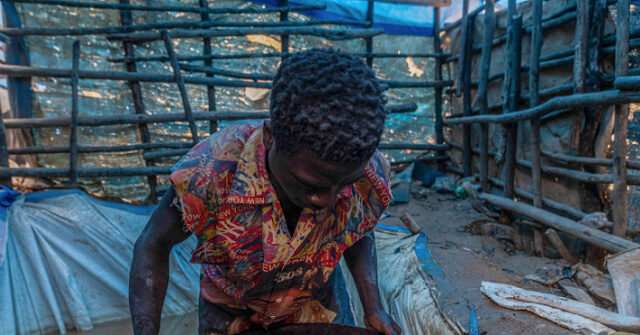The Democratic Republic of Congo (DRC) on Tuesday filed criminal complaints against subsidiaries of electronics giant Apple in France and Belgium, accusing them of using “blood minerals” sourced to mines controlled by armed gangs in the eastern DRC.
The complaint charged Apple France, Apple Retail France, and Apple Retail Belgium with using tin, tantalum, and tungsten extracted from mines in the conflict zone and “laundered through international supply chains.” These metals, known as the “3T minerals,” are extensively used in manufacturing computers and smartphones.
“These activities have fuelled a cycle of violence and conflict by financing militias and terrorist groups, and have contributed to forced child labor and environmental devastation,” the DRC’s lawyers said.
“Color Apple red, and not green. It is a trillion-dollar company that must be assumed to know the consequences of its actions. Enough with denials of accountability and hiding behind the false narrative of supply chain defenses!” said lawyer Robert Amsterdam.
Another member of the DRC’s international legal team, William Bourdon, said the complaints filed in France and Belgium were “a first step towards making one of the biggest players in tech accountable for its policy of endless enrichment at the cost of the most serious of crimes staining African supply chains.”
The DRC’s lawyers informed European Commission President Ursula von der Leyen of their filings and asked her to begin a dialogue on “working towards accountability and an end to armed violence in sub-Saharan Africa’s mineral supply chains.”
The lawyers said they furnished Apple CEO Tim Cook with evidence that his supply chain could include conflict minerals in April 2024.
In 2019, Apple instructed its suppliers to stop doing business with five smelters and refiners who either refused to participate in audits, or “did not otherwise meet Apple’s requirements on the responsible sourcing of minerals. The company said 253 other companies involved in its supply chain passed the required audits.
Apple filed documents with the U.S. Securities and Exchange Commission (SEC) in 2023 stating that none of its smelters or refiners have done business with armed groups in the DRC or surrounding conflict zones. Apple insists that it does not source any of its minerals directly and rigorously audits its third-party suppliers.
An Apple spokesman told the BBC on Tuesday that the company asked its suppliers to “suspend sourcing tin, tantalum, tungsten, and gold from the DRC and Rwanda” earlier this year due to escalating conflicts in the region.
“We took this action because we were concerned it was no longer possible for independent auditors or industry certification mechanisms to perform the due diligence required to meet our high standards,” the Apple representative said.
The DRC lawsuits maintain that Apple is buying minerals stolen from the Congo by savage armed groups that have raped and massacred countless civilians. The minerals are then “laundered” through complex supply chains to give Apple deniability, but the lawsuits claim the Apple subsidiaries in France and Belgium “know very well their minerals supply chain relies on systemic wrongdoing.”
The lawyers added that Belgium has a particularly heavy responsibility to take action against this “pillaging” of the DRC’s resources because it was the Congo’s colonial power during the 19th century.
The DRC, supported by experts from the United Nations, has long argued that gold and 3T minerals pillaged from mines by over a hundred armed rebel groups are smuggled across the border into Rwanda, which is complicit in laundering the minerals for purchase by international electronics corporations. Rwanda has denied these allegations.
The eastern Congo has a long-running problem with “artisanal mining,” meaning small, unlicensed mining operations that often engage in abusive labor practices. Artisanal mining is dangerous, the workers typically use very primitive equipment, and child labor is rampant.
These small mines are also very easy for armed gangs to exploit, as the illegal miners eagerly sell their products to smugglers. Insurgent groups sometimes use extremely brutal methods to seize control of artisanal mines outright.



